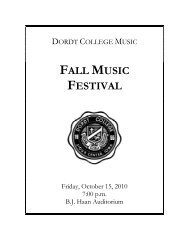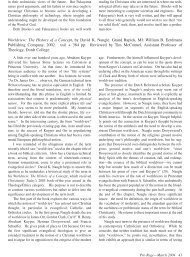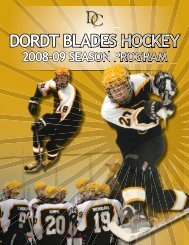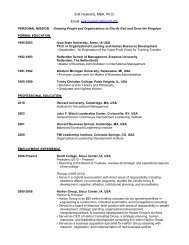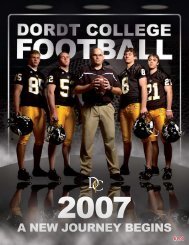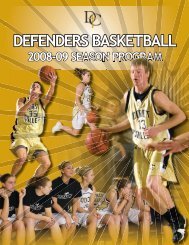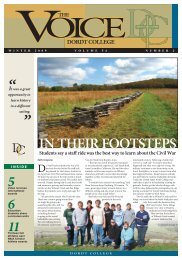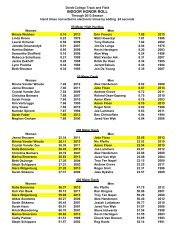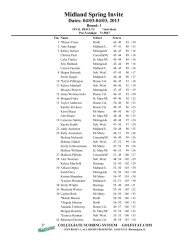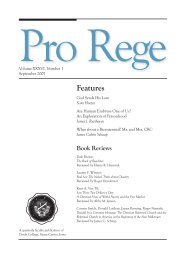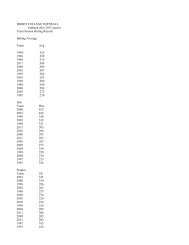June 2009 - Dordt College
June 2009 - Dordt College
June 2009 - Dordt College
You also want an ePaper? Increase the reach of your titles
YUMPU automatically turns print PDFs into web optimized ePapers that Google loves.
that was all that occurred) was the occasion of the<br />
prophetic curse but not the direct cause.<br />
Calvin’s discussion of circumcision also yields<br />
some interesting comments. Calvin’s unease about<br />
circumcision is expressed in his comments on<br />
Genesis 17.11, where the rite of circumcision was<br />
first commanded to Abraham and his offspring.<br />
Calvin calls the command to circumcise “very strange<br />
and unaccountable … at first sight.” 20 He finds it<br />
hard to credit the idea that the sign of so great a<br />
mystery should be situated in the shameful parts. 21<br />
He even thinks that “God seems to us foolishly to<br />
have commanded” circumcision. It was “necessary<br />
for Abraham to become a fool, in order to prove<br />
himself obedient to God.” Calvin concludes that<br />
circumcision was a sign of repentance, and that God’s<br />
aim was to “completely abase the pride of the flesh.”<br />
Calvin seems to have been unaware that circumcision<br />
was common among the peoples of the Ancient Near<br />
East, as he calls the rite something “whereby the seed<br />
of Abraham is distinguished from other nations”<br />
(Commentary on Genesis, 453-54). It should be noted<br />
that if no-one went about naked, people would never<br />
see the distinguishing sign of circumcision, and so it<br />
would be pointless as far as being a witness to others<br />
of God’s special relationship with the Jews. And if<br />
other tribes around them also circumcised their<br />
males, there would be no peculiar aspect to it.<br />
Calvin further comments on circumcision in<br />
his commentary on Isaiah, where God commands<br />
Isaiah to go round naked for three years (Gen. 22.3).<br />
Here too, Calvin reveals much about his views on<br />
nakedness. First of all, he states that if anyone went<br />
around naked of his own accord he would be “justly<br />
ridiculed,” but not if God commands it. This is a<br />
strange manner of reasoning, as if God acts totally<br />
apart from the very morality that he requires of his<br />
people. In response to those who said that nakedness<br />
would be unbecoming in a prophet, Calvin agues<br />
that this “nakedness was not more unbecoming than<br />
circumcision, which irreligious men might consider<br />
to be the most absurd of all sights, because it made<br />
an exposure of the uncomely parts. Yet it must not<br />
be thought that the Prophet went entirely naked or<br />
without covering those parts which would present<br />
a revolting aspect [italics added].” 22 Note these<br />
negative words in regard to what God had created.<br />
He concludes on this matter, “I am therefore of<br />
the opinion that Isaiah walked naked whenever<br />
he discharged the office of a prophet, and that he<br />
uncovered those parts which could be beheld without<br />
shame” (Commentary on the Book of the Prophet Isaiah<br />
88). In other words, he was not really naked.<br />
In this way, Calvin reveals how he associates<br />
shame with the human body and distorts the plain<br />
meaning of Scripture to accommodate his negative<br />
feelings about the body in general, and genitals in<br />
particular. In the Bible passage it is clear that Isaiah’s<br />
nakedness was to exemplify the forced nakedness of<br />
the captives who had their buttocks uncovered, so<br />
we may assume that naked did indeed mean naked.<br />
Prisoners of war were usually stripped naked to be<br />
humiliated. In the sermons on Micah, Calvin notes<br />
nakedness as being a result of involuntary removal<br />
to a foreign land, the result of their sin, their “malice<br />
and rebellion” (Micah 1.11). So Calvin is aware of<br />
this manner of humiliating prisoners of war. But<br />
because he is uncomfortable with the picture of a<br />
prophet of God literally acting out this condition, so<br />
he changes it to mean partially clothed.<br />
My provisional conclusions are as follows: Calvin’s<br />
discomfort and feelings of shame about the body are<br />
probably at least partially related to his own ill health<br />
throughout most of his life. Still, in commenting on<br />
the various Bible passages we discussed, he ought<br />
not to have read more into them than is present.<br />
What he read into them was informed more by his<br />
prejudices and prudery than by the actual words of<br />
Scripture. By sometimes reading more into the text,<br />
as in the Noah account, or by sometimes changing<br />
the plain meaning of the text, as in Isaiah, Calvin<br />
betrayed his own exegetical principles in order to<br />
accommodate his prudery. Moreover, he should<br />
have more consistently applied his teaching that in<br />
Christ we are restored to our innocence. Just because<br />
bodies are often troublesome and pained, and are not<br />
perfect, does not mean they are full of turpitude or<br />
something to be ashamed of.<br />
Endnotes<br />
1. Opera Calvini 23.51(Ioannis Calvini opera quae supersunt<br />
omnia, Ed.W. Baum, E. Cunitz & W. Reuss<br />
[Brunswick 1863-1900]): “Nunc satis habet dicere,<br />
in natura integra nihil nisi honorificum fuisse: unde<br />
sequitur, quidquid in nobis probrosum est, esse culpae<br />
nostrae imputandem, quia parentes nostri nihil in se<br />
habebant non honestum, donec peccato foedati sunt.”<br />
Commentary on Genesis, Vol. 1, tr. John King (Grand<br />
Rapids: Eerdmans, 1948; first published in England,<br />
1847), 137.<br />
16 Pro Rege—<strong>June</strong> <strong>2009</strong>



